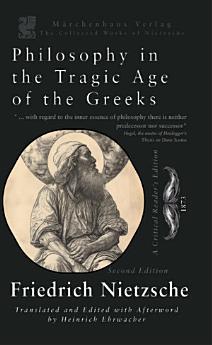Philosophy in the Tragic Age of the Greeks: A New Reader's Edition
May 2024 · The Collected Works of Friedrich Nietzsche Book 24 · Marchen Press
4.0star
2 reviewsreport
Ebook
178
Pages
family_home
Eligible
info
reportRatings and reviews aren’t verified Learn More
About this ebook
In "Philosophy in the Tragic Age of the Greeks," in keeping with his obsession with Pre-Socratic philosophers, Nietzsche examines the philosophical insights of the pre-Socratics in the context of the tragic sensibility of ancient Greek culture. He highlights the profound connection between the tragic view of life and the philosophical quest for understanding, arguing that the early Greek philosophers were deeply attuned to the complexities and contradictions of existence. Nietzsche reflects on the essential dispositions and metaphysical conjectures of figures such as Thales, Anaximander, and Heraclitus, noting how their ideas gestated within a culture that both nurtured and was nurtured by philosophical inquiry. Nietzsche's analysis emphasizes the intrinsic connection between the temperament of the individual philosopher and the broader cultural and existential inquiries of the age. The text highlights the tragic sensibility inherent in Greek culture and suggests that the interplay between this sensibility and philosophical thought reveals deeper truths about the human condition and the cosmos. Through a lens that combines historical insight with philosophical speculation, Nietzsche articulates a vision of philosophy not merely as an academic discipline, but as a profound dialogue with existence itself. This view that the philosophic is important to human life conflicts with his anti-metaphysical worldview, according to Heidegger. The work was first published posthumously in 1913 by C. G. Naumann as part of a collection edited by Nietzsche's sister, Elisabeth Förster-Nietzsche, and his friend Peter Gast. This Critical Reader's Edition offers a modern translation of the original manuscript, designed to help the armchair philosopher engage deeply with Nietzsche's works. The translation features clean, contemporary language with simplified sentence structures and diction, making Nietzsche's complex ideas more accessible. In addition to the main text, this edition includes extensive supplementary material that enhances the manuscript with autobiographical, historical, and linguistic context. It contains an afterword by the translator examining the history, impact, and intellectual legacy of Nietzsche in relation to this work, an index of philosophical concepts with emphasis on Existentialism and Phenomenology, a complete chronological list of Nietzsche's published writings, and a detailed timeline of his life, highlighting the personal relationships that significantly shaped his philosophy.
Ratings and reviews
4.0
2 reviews
About the author
Friedrich Nietzsche (1844-1900) was a watershed German philosopher, cultural critic, poet, musician (briefly) and philologist (the study of ancient manuscripts) whose work has had a profound impact on modern intellectual history. Known for his critiques of European morality and religion (particularly Protestantism), Nietzsche's ideas on the "will to power" and the "Übermensch" have influenced a wide range of philosophical, literary, and psychological thought including thinkers such as Martin Heidegger, Albert Camus, Michael Foucault and the entire Postmodern religion.
Rate this ebook
Tell us what you think.
Reading information
Smartphones and tablets
Install the Google Play Books app for Android and iPad/iPhone. It syncs automatically with your account and allows you to read online or offline wherever you are.
Laptops and computers
You can listen to audiobooks purchased on Google Play using your computer's web browser.
eReaders and other devices
To read on e-ink devices like Kobo eReaders, you'll need to download a file and transfer it to your device. Follow the detailed Help Center instructions to transfer the files to supported eReaders.











